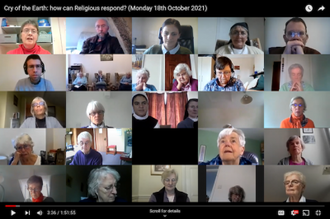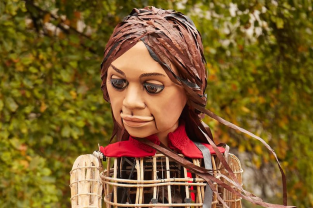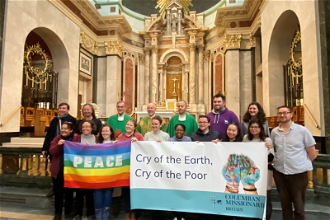Religious hold national meetings on climate crisis

Source: Conference of Religious
Members of religious congregations from across England & Wales came together for two large information sharing meetings, in the weeks leading up to Cop26, to reflect on ways of responding to the climate emergency. Speakers included Dr Emma Gardner, Head of Environment at Salford diocese, Edward de Quay of the Laudato Si' Research Institute at Campion Hall in Oxford, Sr Margaret Atkins OSA of Boarbank Hall in Cumbria and Brother Loarne Ferguson OFM Cap.
The first meeting attempted to set out the big picture of how the Church in England & Wales is responding, such as: diocesan environmental projects / the network of environmental leads which has been developed to foster collaborative work across the dioceses / the question of investment & divestment / lay led initiatives such as the Ecological Conversion Group and parish/clergy awareness.
The speakers at the second meeting were Religious who have put ecology at the heart of their ministry, including Fr Martin Newell CP and Columban Sr Kate Midgley. The two meetings followed a very well attended webinar in January with Bishop John Arnold, Dr Carmody Grey and Sr Sheila Kinsey who is the Rome based co-ordinator of a global project involving Religious, 'Sowing Hope for the Planet.'
Brother Loarne Ferguson is currently seconded onto an environmental project at a rural location in Worcestershire, a deliberate move by his congregation, to prepare him for further ecological initiatives. Since the summer, he's been living with an ecumenical community near Broadway, the 'House of the Open Door,' specifically to work on a bee project. Through ecological means, he is engaged in designing and building a bee shelter, to consolidate many decades of beekeeping (the community has traditionally had up to 60 hives).
He commented: "The focus has been on me getting experience and building a structure, at no cost, with local natural resources." He designed the framework and then commenced a process of foraging for the raw materials. The trunks of dead ash trees were chopped and sanded to make the upright posts of the shelter; gravel discovered in a stream as well as discarded roof tiles were utilised as floor coverings; a large piece of fibreglass was 'found' and became the roof. Recalling 'back-breaking' digging work through the summer, Brother Loarne was glad of volunteers who gave of their time for free, including a local architect. "This is a completely new way of thinking" he said. "My background is in retreat giving and evangelisation. These recent months have involved focusing entirely on creating a shelter where bees' needs are catered for. Pollinators are a really important part of the food chain." He noted that many congregations have installed a bee hive in their grounds. He recommended a 'Bees' Needs' youtube video for those who wish to learn more. See link below. Also at the second meeting, Sr Kate Midgley charted her environmentalism, which she dates back to Good Friday a couple of years ago - "a lightbulb moment, my own ecological conversion!" After some personal research, "I came to understand what we are doing to our planet and that as human beings we are destroying it. It is incumbent upon us - in this generation - to do something about it." By that Easter Sunday Sr Kate had connected with an 'Extinction Rebellion' protest and has subsequently developed her involvement since then, predominantly through 'Christian Climate Action.' This has involved taking part in awareness raising outside Westminster Cathedral and prayer vigils outside Parliament through Lent. "The climate emergency can leave us feeling overwhelmed - but praying in front of that place, where decisions are made, feels very important."
Ahead of Cop26, Sr Kate joined the first leg of a pilgrimage walk from London to Glasgow - and then caught up with climate activist Melanie Nazareth, to record a video interview as the walkers were journeying through Lancashire. Melanie described the rich experience of discussing the climate emergency with so many people along the way and of how different churches came together along the route to support the walkers, commenting: "Prayer is really important in these situations. Cop26 is not the end. We need to build on this. Cop26 in some ways is the start of a big journey into the future."
Feeling the need for a specifically Catholic working group, in conjunction with Fr Martin Newell and around twenty others, another layer of activism was formed last year within Christian Climate Action: 'Catholics for Christian Climate Action.' The organisers commented at the time: "As members of the Catholic Church, inspired by the Holy Spirit to follow Jesus in reading the Signs of the Times, and in response to the call of Laudato Si', we focus on engaging the Catholic Church, that is to say, Catholics generally, Bishops and Dioceses, Religious Orders, and other organisations. Our starting point is the climate and ecological emergency and our belief that the UK needs to aim for zero emissions by 2030 at the latest. This is a matter of climate justice, and the good of the poorest and most vulnerable must be a priority in all our efforts..…..The climate emergency requires political action and engagement, including action within Catholic organisations. We hope to energise this collective Catholic political response to the climate and ecological emergency in the public space, as an effective witness to our faith in our Creator God.
Fr Martin Newell told the meeting he'd been involved in Christian Climate Action for seven years, warning: "If we don't act now, it will be much worse in the future. We are already behind the curve." He explained his rationale for radical activism: "People need to take individual action but the government needs to lead. Just as it acted to put in financial measures during the pandemic, it has to take bold action on the climate emergency. That's why we are involved in so many protests. We always pray in public too. It's important that people look back and see that Christians were there. What we do now will have an effect in 10/20 years time. The time lag means it can be hard for people to understand how serious the situation is."
He reflected on the past year of writing 'to all bishops' requesting that dioceses make the climate crisis a priority and for clergy & lay Catholics to be made more aware and for people to be encouraged to engage with their politicians on it. "These requests are also directed at religious congregations," he added. "We can make changes within our dwellings in terms of living and community life and at the same time press for political changes."
On the specific question of divestment / investment, James Buchanan of Operation Noah gave a briefing on the work of dioceses and religious orders, a movement that is growing in size continually as more organisations get on board: www.operationnoah.org
Sr Margaret Atkins outlined the broad range of ecological work underway in and around her congregation's buildings and land in Cumbria (Boarbank Hall) and also how the pandemic has given rise to hundreds of people attending Laudato Si' retreat/prayer sessions via zoom.
One question put by Cistercian Sisters present at the meeting was how individual congregations and Religious could discern the right course of action in response to the complexity of the climate crisis. Brother Loarne responded by referencing St John Henry Newman's 'convergence of probabilities' - from which arises growing awareness and certitude. Through stillness and prayer, asking for enlightenment and guidance on where to start, opportunities for action will surely arise he said. "Small steps will present themselves."
LINKS
Sowing Hope for the Planet.' - www.sowinghopefortheplanet.org
Bees Needs - www.youtube.com/watch?v=7uVeyH7XQXg
Camino to COP - www.caminotocop.com
An earlier article on Sr Margaret's work can be read here: https://bit.ly/3iOBJcD


















